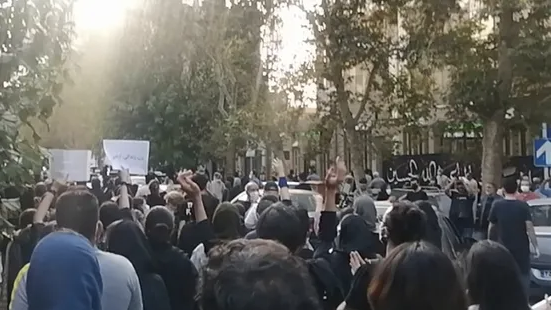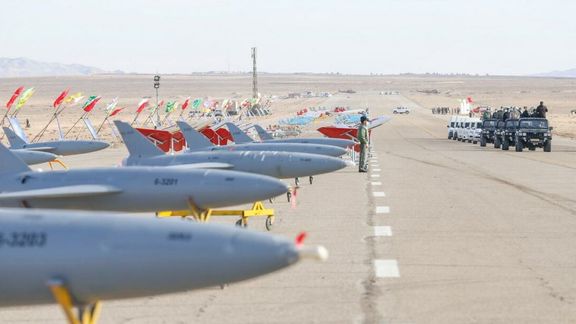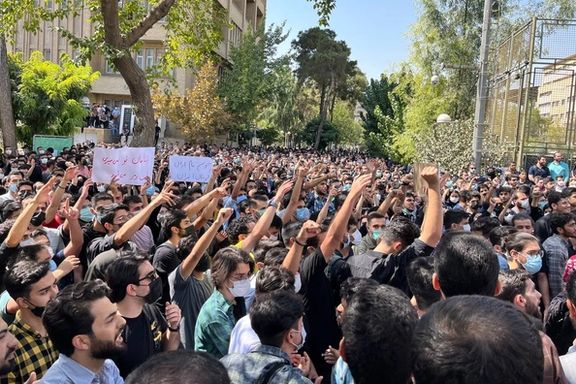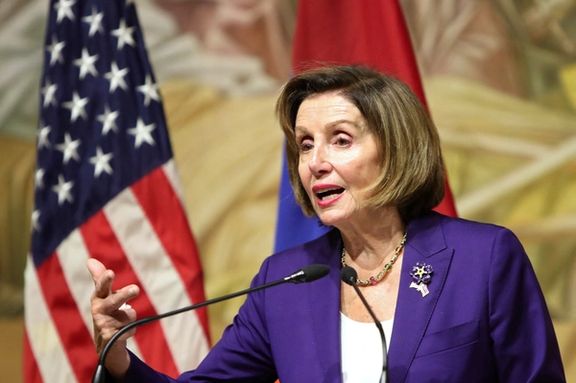Iran Ready To Start Sending 600k Tons Of Free Fuel To Lebanon

Iran has reiterated its offer to send 600,000 tons of fuel to Lebanon over the course of five months to help the country deal with its power shortage.

Iran has reiterated its offer to send 600,000 tons of fuel to Lebanon over the course of five months to help the country deal with its power shortage.
According to Lebanese TV station Al-Manar, Iranian officials told a visiting Lebanese technical delegation on Tuesday that Tehran is ready to start the shipments.
On Monday, Iran's embassy in Beirut said tankers could be in Lebanon within two weeks. A Lebanese energy ministry spokesperson said they were unaware whether the fuel import deal had been struck but said "any gift from anywhere is welcome".
If the deal goes through, it would be Iran's first supply of fuel directly to the Lebanese state. The Islamic Republic previously sent some shipments of fuel to its ally Hezbollah, an armed group that is part of Lebanon's coalition government.
Earlier in September, two Lebanese government sources said Beirut was about to send a delegation to Iran for talks on acquiring “free fuel” after Iran's Ambassador Mojtaba Amani proposed an Iranian "gift" of fuel to the country.
Lebanon has been struggling with outages for decades but its economic meltdown since 2019 has drained state reserves and slowed down imports of fuel for government plants, leaving most of the country with just one or two hours of state-provided electricity per day.
Lebanon has natural gas fields in the Mediterranean Sea but a boundary dispute with Israel has so far prevented gas extraction that could help its economy.
The delivery of free fuel to another country is a sensitive issue in Iran where an economic crisis has impoverished millions of people, while the government has failed to reach a nuclear deal with the West, which could end economic sanctions imposed by the United States since 2018.

SpaceX CEO Elon Musk has said that his company will ask for an exemption from US sanctions on Iran to provide the firm's Starlink satellite broadband Internet access for Iranians.
Musk made the announcement in a tweet on Monday as Iran is engulfed in widespread protests over the death of a young woman in the custody of hijab enforcement patrols.
Some people on Twitter had asked Musk to provide the satellite-based internet stations as he did for the people of Ukraine after the Russian invasion. However, most Ukrainians have not been able to access the internet via Starlink because it needs special equipment and is somehow too complicated to set up.
Since protests over the death of Mahsa Amini started in several cities across Iran, including in the capital Tehran, internet connection was significantly slowed down, a strategy the government usually uses during protests in Iran.
Authorities disrupt the Internet to prevent news of unrest reaching the rest of the country and abroad, and to prevent protesters from galvanizing support in nearby regions.
Operated by Elon Musk’s company SpaceX, Starlink provides internet access coverage to most of the Earth.
In May, following the shutdown of internet connection after popular protests over bread prices in southwestern Iran, Victoria Coates, who served as senior advisor to the energy secretary in the Trump administration, called on Musk to activate Starlink satellite access for Iranians.
Iran’s former communication minister Mohammad-Javad Azari-Jahromi had warned Iran’s parliament against plans to restrict Internet access, saying that “if you do not provide people with the right service, others will”.

The US on Monday said it added three Iranian cargo planes serving Russia to a list of aircraft violating US export controls under the Biden administration's sanctions.
Using commercially available data, the Commerce Department identified Boeing 747s operated by Mahan Air, Qeshm Fars Air and Iran Air transporting goods, including electronic items, to Russia in apparent violation of stringent US export controls on Russia related to its invasion of Ukraine. These are the first three Iranian airplanes identified, the department said.
The department has warned that any refueling, maintenance, repair, spare parts or services violate US export controls and subject companies to US enforcement actions.
Iran has publicly announced its intention to expand cooperation with Russia in the aviation sector by providing spare parts for its airplanes, the Commerce Department said.
The US and Ukraine have said that Iran has already provided military drones to Russia that are being used in the war.
With the additions, there were 183 aircraft on the list for apparent violations of US export controls. The three Iranian airlines identified Monday were already subject to a variety of restrictions by the US government.
Assistant Secretary of Commerce for Export Enforcement Matthew Axelrod said US "controls, especially on items such as electronics and aircraft parts, have degraded Russia’s defense industrial base, severely restricted their access to the world economy."
"When Russia seeks to engage pariah states like Iran in order to backfill for what the international community has cut off, we will take action to thwart such attempts and disrupt such connections," he added.
Reporting by Reuters

American officials and politicians condemned the death of a young woman in police custody in Iran, following significant protests Monday in Tehran and other cities.
Secretary of State Antony Blinken tweeted that Mahsa Amini “should be alive today,” referring to the 22-year-old who was arrested on September 13 by the religious police for her loose hijab and two hours later delivered to a hospital in coma.
“Instead, the United States and the Iranian people mourn her. We call on the Iranian government to end its systematic persecution of women and allow peaceful protest,” Blinken wrote.
US National Security Adviser Jake Sullivan also tweeted about Mahsa Amini’s death, saying “Her death is unforgiveable. We will continue to hold Iranian officials accountable for such human rights abuses,” adding the trending hashtag of #MahsaAmini.
But as protests unfolded in several Iranian cities and towns on Monday and the center of the capital Tehran was the scene of thousands of protesters confronted with ninja-like anti-riot police, Iran’s President Ebrahim Raisi, sanctioned for his culpability in human rights violations, stepped down from his plane into US soil in New York.
Iranian activists and US lawmakers had urged the administration for weeks to deny a visa to Raisi and his large entourage, but the White House still entangled in nuclear talks with Tehran apparently had issued the permission long ago.

Hundreds of people left comments on these tweets, saying that mere expression of sorrow or support are not sufficient, and the United States should do more to show it supports Iranians. Many also commented that Riaisi should not have been given a visa to go the New York to attend the UN General Assembly.
An Iranian, Nasim Behrous replied to Sec. Blinken, “Iranians know very well that such tweets are just a political gesture with no practical effect and deep down you are also aware that the Iranians’ desire are not peaceful demonstrations & ease on women’s rights, but overthrowing the regime. You absolute double-dealer!”
Another Twitter user replied to Blinken saying that Mahsa Amini’s “blood is on your hands too,” for negotiating with the Islamic Republic with the possible end result of lifting sanctions, “sending them money so they could afford more suppression.”
A few Republican lawmakers opposed to a nuclear deal with Iran also criticized the administration.
“As Iranian President Ebrahim Raisi arrives in the United States on a visa granted to him by the Biden Administration, the American people stand with the brave Iranians who are coming together once again to protest the regime’s brutality,” Rep, Claudia Tenney tweeted. Sen Tom Cotton also tweeted against granting a visa to President Raisi.
The European Union’s External Action arm of the Diplomatic Service issued a statement condemning Mahsa Amini’s death. “What happened to her is unacceptable and the perpetrators of this killing must be held accountable,” the statement said on Monday.
France's Ministry of Foreign Affairs Monday also condemned the arrest and violence that lead to Amini's death. In a statement, the ministry said that her death at the hands of Iran's morality police is "profoundly shocking" and called for a transparent investigatiion.
Raisi has dismissed any suggestion of meeting or speaking with Joe Biden in New York, as the US President also will be at the United Nations on Wednesday when both are scheduled to deliver speeches. Iran has refused to have any direct contact with American officials during 17 months nuclear talks held in Vienna and elsewhere. The EU acts as the mediator in the talks.

France's foreign minister said on Monday that there would not be any better offer for Iran to revive the 2015 nuclear deal with world powers as Tehran is dragging out the talks.
Catherine Colonna said on the sidelines of the United Nations' General Assembly in New York that "There will not be a better offer on the table and it's up to Iran to take the right decisions," adding that there are no initiatives underway to unblock the situation.
She reiterated that it was up to Tehran to decide now because the window to find a solution was closing.
She added that the United States and its European partners have similar positions on Iran’s demand for the International Atomic Energy Agency to drop its probe over uranium traces at three previously undeclared sites in Iran, the contentious issue that seems to be stalling a final agreement.
In two separate interviews ahead of leaving Monday for the United Nations General Assembly (UNGA) in New York, where President Ebrahim Raisi is due to speak this week, he said Iran is ready to revive the agreement given guarantees that the United States and Europe will uphold it.
“If there were guarantees, then the Americans could not withdraw from the deal,” Raisi said. “The Americans broke their promises, they did it unilaterally…We cannot trust the Americans because of the behavior we have already seen from them.”

Iran's foreign ministry reiterated Monday that only political solutions can resolve the conflict between Armenia and Azerbaijan, its northwestern neighbors.
"We believe in the necessity of using political approaches and solutions to end conflicts and reduce tension and political dialogues to resolve the differences between the two countries," the ministry’s spokesman Nasser Kanaani told reporters at his weekly press briefing in Tehran.
Kanaani said Iran did not spare any efforts to help end the conflict after border clashes broke out between its northwestern neighbors Tuesday and said the Iranian president spoke with Armenian Prime Minister Nicole Pashinyan while foreign minister Hossein Amir-Abdollahian held a phone conversation with his Azerbaijani counterpart to resolve the situation.
“Escalation of tensions and instability in South Caucasus will not serve the interests of any of the involved and neighboring countries. What can solve the crisis is dialogue between the two countries and the use of regional capacities to stabilize the region," he added while stressing that Tehran considers any other approach “provocative”.
Iran has to an extent supported Armenia in the conflict with Azerbaijan and has warned that it would not allow any seizure of territory from Armenia proper by Baku. Tehran in the past has also expressed alarm at alleged Israeli military presence in Azerbaijan. Amir-Abdollahian also warned in October 2021that Iran would not tolerate "geopolitical change" in the region and at its borders.
In response to a question about US House of Representatives Speaker Nancy Pelosi's visit to Armenia and her expression of support for Yerevan, callingBaku an occupier, and American presence in the Caucasus, Kanaani reiterated that Iran viewsthis issue within the framework of Tehran’s afore-declared “principled political view of the developments in the South Caucasus and the conflict”.
Pelosi on Sunday said it was obvious that the border fighting was triggered by Azeri assaults on Armenia and that the chronology of the conflict should be made clear and pledged American support for Armenia’s sovereignty.
Pelosi's candid support for Yerevan has hugely angered Baku, which Armenia says has occupied some of its territories when the border clashes broke out a week ago.
The Armenian Prime Minister has accused Baku of attacking Armenian towns to avoid negotiating over the status of Nagorno-Karabakh, an Armenian-populated enclave inside Azerbaijani territory, while Azerbaijan accuses its neighbor of carrying out intelligence activity along the border and moving weapons and attacking it's military positions along the border.
Speaker of Armenia’s parliament, Alen Simonyan, last week criticised the response of a Russian-led military alliance to Yerevan's request for help. Russia, which operates a military base in Armenia, sent thousands of peacekeepers to the region in 2020 as part of a deal to end six weeks of hostilities during which Azerbaijan make significant territorial gains in and around Nagorno-Karabakh.
Nearly 300 people were killed, and dozens were injured in the recent conflict which marked a major escalation in the 2020–2022 Armenia–Azerbaijan border crisis.
The escalation of decades-old hostilities between the south Caucasus countries has fuelled fears that a second full-fledged war could break out in the post-Soviet world in addition to Russia's invasion of Ukraine.